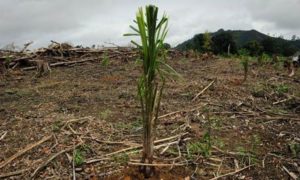
Vague legal definitions may allow Indonesia to class forests as 'degraded' and 'rehabilitate' the land with palm trees and biofuel crops
Indonesia plans to class large areas of its remaining natural forests as “degraded” land in order to cut them down and receive nearly $1bn of climate aid for replanting them with palm trees and biofuel crops, according to Greenpeace International.
According to internal government documents from the forestry, agriculture and energy departments in Jakarta, the areas of land earmarked for industrial plantation expansion in the next 20 years include 37m ha of existing natural forest – 50% of the country’s orangutan habitat and 80% of its carbon-rich peatland. More than 60m ha – an area nearly five times the size of England – could be converted to palm oil and biofuel production in the next 20 years, say the papers.
“The land is roughly equivalent to all the currently undeveloped land in Indonesia,” says the report. “The government plans for a trebling of pulp and paper production by 2015 and a doubling of palm oil production by 2020.”
The result, says the environmental group in a report released in Jakarta today, would be to massively expand Indonesia’s palm, paper and biofuel industries in the name of “rehabilitating” land, while at the same time allowing its powerful forestry industry to carry on business as usual and to collect international carbon funds.
“[Money] earmarked for forest protection may actually be used to subsidise their destruction with significant climate, wildlife and social costs,” said the report.
The report comes at a critical time in global climate talks, due to resume next week in Cancun, Mexico. Forestry and peatland contribute nearly 18% of all global carbon emissions and Indonesia is negotiating a model $1bn forestry deal with Norway and the US. This could save millions of tonnes of climate emissions in return for Indonesia agreeing to a moratorium on future forest and peatland clearances.
But weak legal definitions of “forest” and “degraded land”, have allowed the global logging industry and officials in some governments to take advantage of an ambitious UN forest-reform scheme known as Redd (Reduced emissions from deforestation and degradation). This would pay countries to replant trees and restore land. Indonesia has pledged drastic action to reduce its greenhouse gas emissions by 26% on its own and 42% with international climate aid. If it agrees to a binding deal to limit deforestation, says Greenpeace, this would send a powerful message to other forested countries.
“A strong deal to prevent the destruction of natural forests and peatlands would put the troubled climate talks back on track. But if international money intended to support the protection of forests and peatland is allowed to enable their destruction, any confidence in the UN talks is expected to dissolve,” said a Greenpeace spokeswoman.
The Indonesian and Norwegian governments last night declined to respond until they had seen the report.
Source: guardian.co.uk

